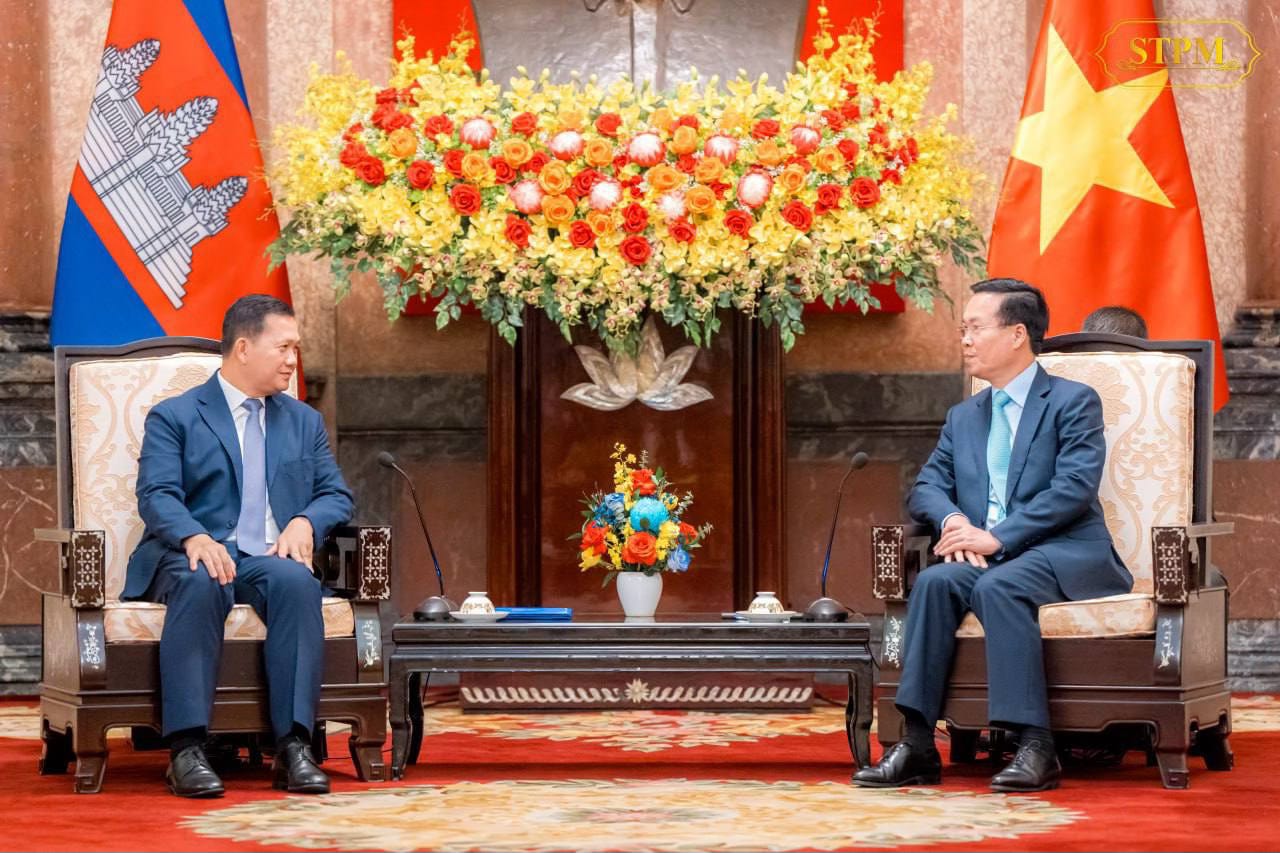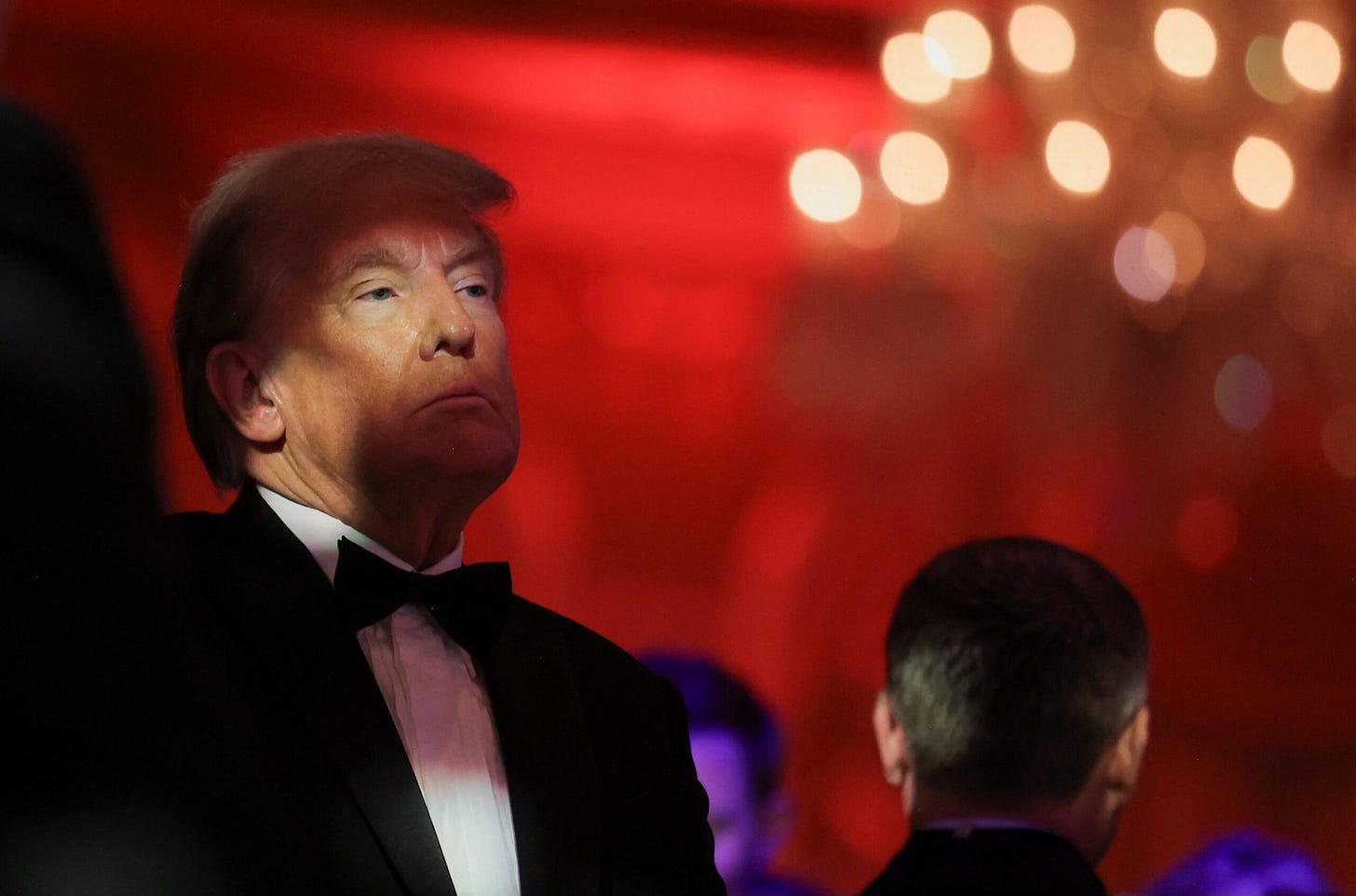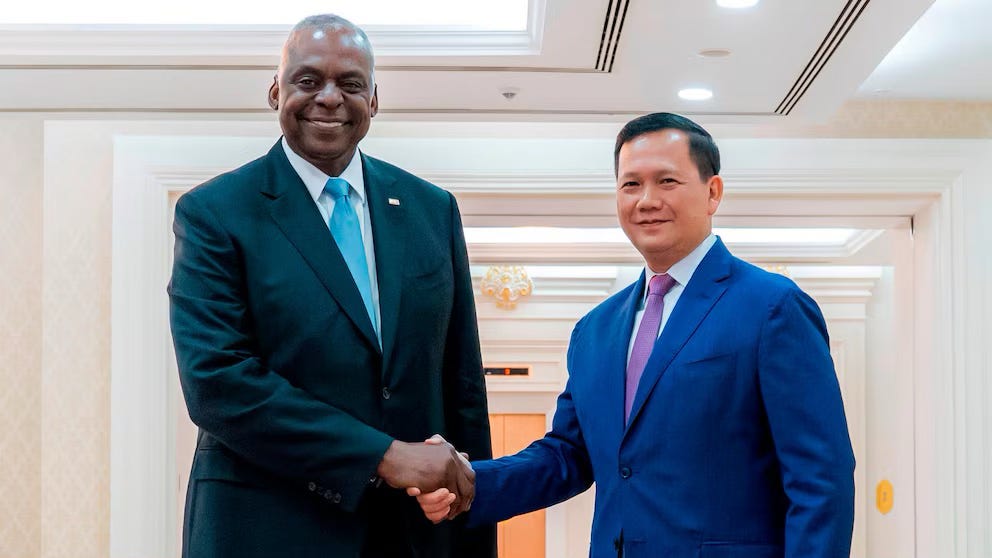New Triangulations
Cambodia’s withdrawal from Vietnam-led triangle initiative signals shift toward more autonomy under new leader Hun Manet. What Will Happen To The Philippines Under Trump?
Cambodia’s soft but sure break from big brother Vietnam
Cambodia’s withdrawal from Vietnam-led triangle initiative signals shift toward more autonomy under new leader Hun Manet
by Chandarith Neak and Chhay Lim
The Cambodia-Laos-Vietnam Development Triangle Area (CLV-DTA) has long epitomised the commitment of these three Southeast Asian nations to shared growth and regional integration.
Over two decades, the CLV-DTA has facilitated development projects and cross-border investments aimed at fostering mutual understanding and prosperity.
However, Cambodia’s recent decision to withdraw from the three-way initiative marks a pivotal turning point, signaling a move toward greater strategic autonomy in Phnom Penh. This move reflects Cambodia’s determination as a small state to reclaim its agency amidst complex regional dynamics and sensitivities.
The departure serves two primary purposes: enhancing domestic legitimacy for Prime Minister Hun Manet’s administration and signaling to the international community that Cambodia is opening a new era of independent foreign policy.
Vietnam-Cambodia relations are colored by a complicated history of colonialism, conflict and intervention. Vietnam’s military involvement in Cambodia from 1979 to 1989, which served to end the killer Khmer Rouge regime, engendered mixed feelings of gratitude and resentment among Cambodians.
This intervention established a paternalistic dynamic, with Vietnam seen as both liberator and overbearing protector. Cambodia’s withdrawal from the CLV-DTA can thus be interpreted as a vital step in reasserting its sovereignty and recalibrating this “brotherly” yet often one-sided relationship.
At the core of Cambodia’s decision lies the issue of domestic legitimacy. Rising nationalist sentiments and public pressure against perceived entrenched Vietnamese influence have intensified demands for greater autonomy.
With social media and grassroots activism amplifying these voices, Cambodians are increasingly vocal about reclaiming their sovereignty and resisting perceived Vietnamese dominance. For new Prime Minister Hun Manet, the withdrawal presents an opportunity to bolster his image as a strong leader responsive to public sentiment.
The move also reflects the Hun Manet government’s commitment to more self-led economic development. A public fundraising campaign for new border infrastructure, which has already garnered US$27 million in pledges, is answering rising calls for more domestic-driven investment.
If successful, these ventures promise to build Hun Manet’s image as a capable and responsive reformer.
Beyond domestic politics, the decision to withdraw also reveals a broader foreign policy dilemma: balancing the economic benefits of CLV-DTA participation with growing nationalist sentiments against Vietnamese influence in the Cambodian economy.
Cambodian diaspora protests against the CLV-DTA as a tool of Vietnamese hegemony have highlighted these anxieties, compelling the government to respond to calls for greater autonomy. Critics within Cambodia have asserted that the CLV-DTA compromises national independence and facilitates Vietnamese encroachment on Cambodian territory.
This rising sentiment carries significant implications for Cambodia’s foreign policy strategy and its approach to regional partnerships and cooperation frameworks. In this context, Cambodia’s withdrawal from the CLV-DTA can be viewed as a “smart hedger.”
As a smart hedger, Cambodia seeks to balance relationships with multiple powers to optimize its interests while mitigating risks. By distancing itself from a Vietnam-dominated framework, Cambodia is actively exploring closer ties with major powers and other Association of Southeast Asian Nations (ASEAN) members, thereby reducing overreliance on any single power.
This shift enables the country to manage its national interests with greater flexibility, reflecting a domestic political maneuver aimed at both quelling internal dissent and reinforcing the government’s position – as articulated by former Prime Minister Hun Sen – to “disarm the oppositions.”
This strategic pivot is exemplified by Cambodia’s increasing investment in projects like the China-backed Funan Techo Canal, which has significant implications for Cambodia’s economy and relationship with Vietnam.
While designed to enhance trade routes and reduce Cambodia’s dependence on Vietnamese southern ports for its trade, the canal symbolizes a crucial shift in Cambodia’s assertiveness to drive its own development path, albeit in this instance with Chinese backing.
In this context, the proclaimed “ironclad friendship” with China can be seen as a cultivated effort to enhance strategic autonomy as a small state and redefine its economic relationship with the wider region in pursuit of upper-middle-income status by 2030 and high-income status by 2050.
The question now is: what lies ahead after CLV-DTA withdrawal? For one, the prevailing argument that Cambodia-China relations will come at the expense of Vietnam may be overblown. Protecting sovereignty and peaceful coexistence with neighboring countries are core values in Cambodia’s foreign policy.
Rather than seeking to undermine Vietnam, Cambodia is committed to a diplomatic approach that emphasizes mutual respect and cooperation. This is evident in Phnom Penh’s soft approach to neighborhood diplomacy, which prioritizes dialogue and understanding over confrontation.
The recent Greater Mekong Subregion Summit, where both Cambodia and Vietnam actively participated, underscores the fact that Cambodia and Vietnam continue to cooperate within broader regional frameworks.
Indeed, Cambodia’s withdrawal from the CLV-DTA does not intend to downgrade relations with Vietnam, but rather reflects a broader diversification of its foreign policy strategy.
This diversification allows Cambodia to strengthen existing partnerships, including with Vietnam, while consolidating ties—notably with China, the US, Japan, Australia, South Korea—in line with its “strengthening old friends, making new friends” approach.
Moreover, the CLV-DTA countries have agreed to meet on the sidelines of high-level multilateral meetings such as ASEAN summits and other multilateral forums.
This will provide a platform for the three neighbors to continue collaborating on mutual interests, ensuring that their partnership remains strong despite evolving individual foreign policy dynamics.
In this direction, Cambodian leaders have also consistently reassured their Vietnamese counterparts about development projects that have caused concern, including not least the China-backed canal. This gesture reflects Cambodia’s aim to calm any potential tensions that may unnecessarily arise from mismanaged nationalist sentiments.
After all, Vietnam remains one of Cambodia’s top five foreign direct investors, with Vietnamese enterprises holding 205 active projects in the country and a total registered capital of $2.94 billion. Cambodia ranks second among the countries and territories where Vietnam invests, while Vietnam is Cambodia’s second-largest export destination, following the United States.
Ultimately, Cambodia’s pursuit of strategic autonomy and its legitimate development rights deserve respect and recognition. As noted by one prominent Vietnamese scholar, the strategic autonomy of individual states is essential for fostering peaceful coexistence in the Indochina sub-region, especially in a rapidly evolving regional landscape.
Cambodia’s withdrawal from the CLV-DTA crystallizes Prime Minister Hun Manet’s rhetoric of “breathing through our own nose” while showcasing his recalibrated foreign policy. As a smart hedger, Cambodia aims to reduce dependence on any single neighbor, particularly one that could be perceived as a potential threat.
Guided by the legacies of former Prime Minister Hun Sen and the aspirations of Hun Manet, this move effectively strengthens domestic legitimacy while affirming foreign policy autonomy.
By prioritising national interests and responding to domestic sentiments, Cambodia asserts itself as a sovereign actor, shaping its own path toward development and regional cooperation.
NB: Dr. Chandarith Neak is the director of Institute for International Studies and Public Policy (IISPP) of Royal University of Phnom Penh (RUPP).
NB: Chhay Lim is a Monbukagakusho-MEXT scholar at Ritsumeikan University in Japan. He is concurrently serving as a visiting fellow at the Center for Southeast Asian Studies of the Royal University of Phnom Penh in Cambodia and as a young leader at Pacific Forum, a think tank based in Hawaii, United States.
https://asiatimes.com/2024/11/cambodias-soft-but-sure-break-from-big-brother-vietnam/
What Will Happen To The Philippines Under Trump’s New Asia Policy?
Prof. Anna Rosario Malindog-Uy
The Philippines is one of the key players in Southeast Asia, and with the new administration in the White House, many are wondering how Trump’s new Asia policy will affect the country. From trade agreements to military alliances, the implications of Trump’s policy are far-reaching. In this video, I discuss with Anna Malindog-Uy what the future may hold for the Philippines under Trump’s leadership. Will the country benefit from the new policy or will it face significant challenges? Join us as we examine the potential consequences of Trump’s new Asia policy on the Philippines.
Source: Geopolitical Trends, w/Dr. O
Prof. Anna Rosario Malindog-Uy is a Ph.D. Candidate at the Institute of South-South Cooperation and Development (ISSCAD), Peking University, Beijing, China. Currently, she is a Senior Researcher of the South China Sea Probing Initiative (SCSPI) and a Senior Research Fellow of the Global Governance Institution (GGI). Prof. Anna Uy taught Political Science, International Relations, Development Studies, European Studies, Southeast Asia, and China Studies. She is a researcher-writer, academic, and consultant on a wide array of issues. She has worked as a consultant with the Asian Development Bank (ADB) and other local and international NGOs.
https://headsightbyanna.com/2024/11/16/what-will-happen-to-the-philippines-under-trumps-new-asia-policy-conversation-w-anna-malindog-uy/
Cambodia Should Maintain its Policy of Not Seeking Favours from the U.S.
The message conveyed by voters in the US election is crystal clear – they seek a president who places their needs and priorities at the forefront of his agenda. Through Donald Trump’s campaign promise of an “America First” approach focusing on matters, like employment opportunities, economic well-being and safeguarding security, it is evident that his administration will give precedence to these issues resulting in a potential shift where foreign aid and diplomatic efforts take a back seat.
Throughout history and across administrations, in the United States there have been varying approaches to foreign policy. Some presidents have placed an emphasis on involvement and collaboration whereas others have turned their focus inward towards domestic matters sometimes neglecting international obligations. If Trump follows through with his campaign promises, his strategy may result in reduced US Engagement in affairs with a priority given to policies that directly benefit American citizens. This shift reflects the evolution of a society where leaders are elected to represent the interests of their own people and should be viewed in this context.
In the case of Cambodia, it would not be wise to depend on the US for treatment, assistance or involvement in issues. Any interaction with the US should be based on benefits than counting on selfless assistance from a government that will be focusing internally.
Cambodia needs to have a practical foreign policy strategy that considers various factors such as its location in Southeast Asia and its historical connections with both Western and Eastern nations to promote stability and self-reliance through diplomatic efforts. The country shares relationships with neighboring ASEAN nations and is significantly impacted by China’s involvement in the region; nonetheless excessive dependence on a key allies for economic and political backing could constrain Cambodia’s independence and ability to make decisions freely.
In order to create a future that’s both environmentally friendly and able to withstand challenges, in Cambodia’s situation requires broadening its global connections and building stronger ties with various nations beyond just the prominent ones like the United States, China, and the European Union by also engaging with other ASEAN members and emerging markets worldwide. By maintaining a balanced approach to foreign relations Cambodia can prevent over reliance on any single nation and therefore minimize vulnerabilities linked to changes in their diplomatic strategies.
Minimising Reliance on External Aid
Throughout its history Cambodia has leaned on help from abroad from nations and groups to back projects for progress. Putting much trust in outside aid can block lasting advancement and autonomy. In the future Cambodia ought to aim for self-reliance by concentrating on boosting businesses upgrading education and infrastructure and nurturing creativity and business spirit.
Diversifying the economy is crucial, in this context as Cambodia’s current economic reliance mainly lies in the garment sector, agriculture, and tourism sectors, despite their importance looking into developing industries like technology, energy, and digital services could provide opportunities This diversification not only enhances the economy but also lessens susceptibility to shifts in US policies or global influences
Steering clear of relying on China
In the years Cambodia has deepened its connections with China which has emerged as a major contributor in terms of investment, trade, and assistance for the country. Although the assistance from China has brought advantages relying heavily on one nation comes with potential drawbacks. Forming a bond with China could result in political reliance that restrict Cambodia’s independence and its capacity to interact openly with other countries. Moreover, this connection has at times drawn scrutiny from nations that perceive Cambodia as giving preference to interests at the expense of regional harmony and human rights issues.
In order to secure Cambodia’s lasting independence, it is important to maintain an approach in dealings with China by strengthening economic connections with other countries. Increasing engagement with ASEAN nations, pursuing alliances with the European Union, and keeping communication lines open with the United States are all measures for achieving a rounded foreign policy.
Promoting Unity in the ASEAN Region
As a part of ASEAN alliance group membership, in Southeast Asia region along with countries like Cambodia ought to focus on working together with neighbouring nations for mutual benefits and growth opportunities in various areas such as trade, deals security matters, and environmental concerns that have a direct impact on Cambodia’s development and sustainability. By fostering stronger relationships within ASEAN not only can Cambodia increase presence within the region but also leverage the combined strength of the bloc when engaging in talks with major international players around the world.
The non-alignment principle of ASEAN allows member nations to cultivate relationships with powers based on their terms and interests. Cambodia can utilize this principle to form alliances that benefit the goals while maintaining ASEAN unity intact. In the face of challenges such as development, climate change, and geopolitical rivalries in the region, ASEAN’s cooperative approach becomes increasingly crucial. Cambodia’s active involvement within ASEAN could also help secure advantages with the US and other major countries that recognize ASEAN’s growing importance on the stage.
Peering into the Future with a Practical Perspective of anticipating treatment from the United States, Cambodia should take a practical stance towards foreign policy by acknowledging the constraints of external assistance and concentrating on enhancing self-reliance internally as economy and society progress and transform.
President elect Trumps emphasis on prioritizing interests should prompt Cambodia to reassess its approach to relations as a wakeup call for all people to realize that other countries prioritize their own needs first and foremost. By crafting a rounded foreign policy and fortifying alliances within the region, Cambodia can pave the way for a secure and flourishing future despite the ever-changing global landscape.
To sum up, Cambodia ought not to rely on the United States for treatment with the leadership in place but rather strive towards establishing nation as a resilient and self-sufficient player on the world stage through collaborative efforts from both leaders and citizens alike. Through forming a variety of partnerships, decreasing dependence on any one force and promoting unity within the region, Cambodia can adeptly handle the intricacies of diplomacy with assurance. The way ahead doesn’t depend on seeking treatment but on developing a policy that align with the long-term goals of our nation.
NB: Dr. Seun Sam is a policy analyst of the Royal Academy of Cambodia. The views expressed here are the author’s own.






